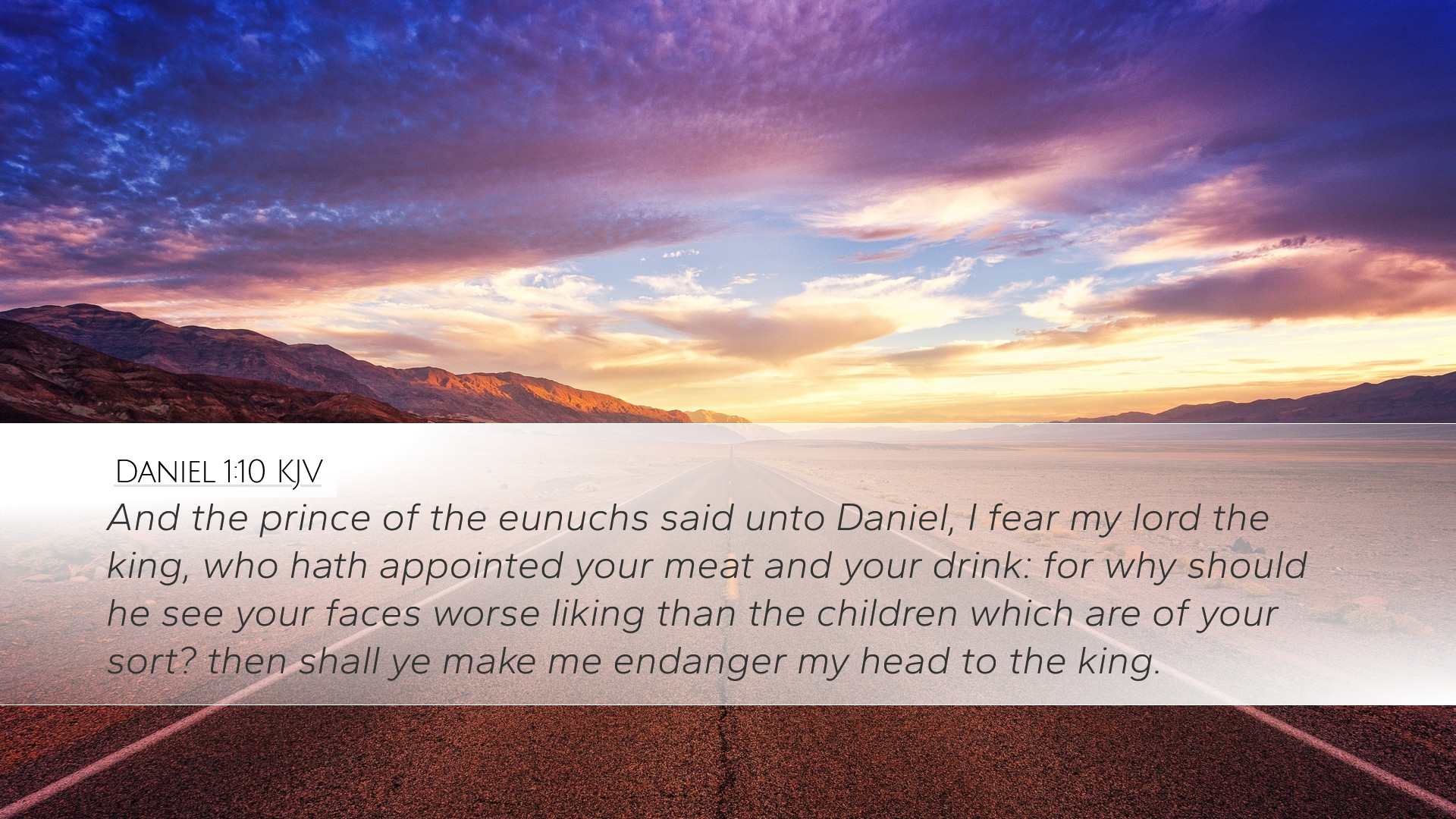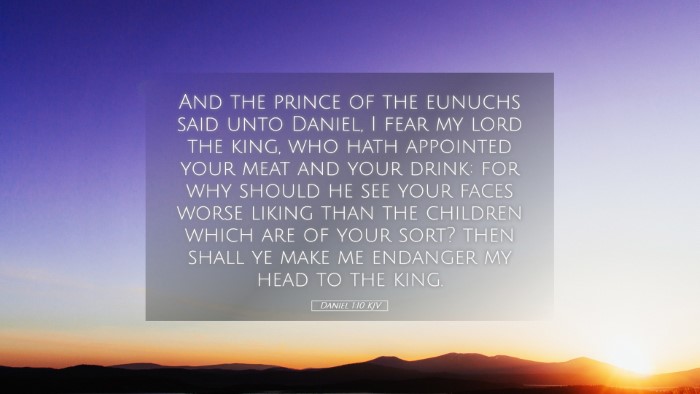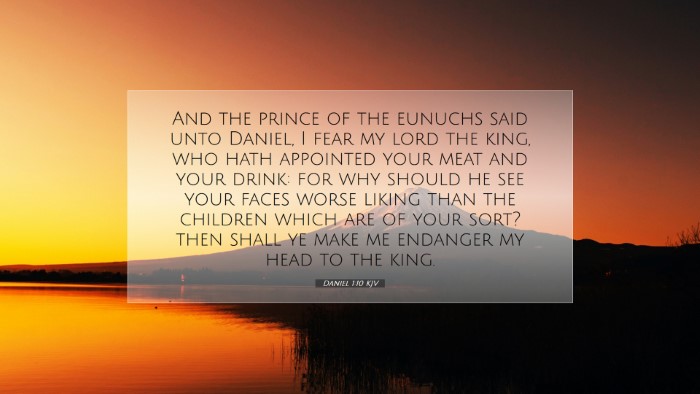Old Testament
Genesis Exodus Leviticus Numbers Deuteronomy Joshua Judges Ruth 1 Samuel 2 Samuel 1 Kings 2 Kings 1 Chronicles 2 Chronicles Ezra Nehemiah Esther Job Psalms Proverbs Ecclesiastes Song of Solomon Isaiah Jeremiah Lamentations Ezekiel Daniel Hosea Joel Amos Obadiah Jonah Micah Nahum Habakkuk Zephaniah Haggai Zechariah MalachiDaniel 1:10
Daniel 1:10 KJV
And the prince of the eunuchs said unto Daniel, I fear my lord the king, who hath appointed your meat and your drink: for why should he see your faces worse liking than the children which are of your sort? then shall ye make me endanger my head to the king.
Daniel 1:10 Bible Commentary
Commentary on Daniel 1:10
Verse: "And the chief of the eunuchs said to Daniel, 'I fear my lord the king, who has appointed your food and your drink, for why should he see that you were in worse condition than the youths who are of your own age? So you would endanger my head with the king.'
Context and Background
In the historical context of Daniel 1, we find the young Daniel and his companions taken captive during the Babylonian exile. They are brought to the palace of King Nebuchadnezzar, where they are selected for training in the royal service. The verse 1:10 gives insight into the dialogue between Daniel and the chief of the eunuchs, highlighting the tension between obedience to earthly authority and adherence to God’s commandments.
Analysis of Key Themes
Fear of the King
The chief of the eunuchs' fear of King Nebuchadnezzar serves as a critical point in the narrative. Albert Barnes emphasizes that the natural fear of losing one's life often leads to compromise in matters of faith and duty. The eunuch’s concern reveals the perilous situation for those serving under a powerful ruler who demands complete obedience.
Dietary Laws and Obedience
Daniel's resolve not to defile himself with the king’s food reflects his commitment to the dietary laws established by God. Matthew Henry notes that this decision was not merely about diet but was symbolic of Daniel's overall commitment to holiness and righteousness in a foreign land. The refusal to partake of the royal provisions highlights the distinction between God’s commands and worldly practices, urging readers to evaluate their lives in light of divine ordinances.
The Role of the Chief Eunuch
The chief of the eunuchs serves as a bridge between Daniel and the royal demands. Adam Clarke points out that the chief's position was precarious; he was responsible for the well-being of the king’s appointed servants and feared repercussions should they appear unhealthy due to Daniel's request for an alternate diet. It reflects the tension that servants of God often face when human authorities set laws contrary to divine directives.
Lessons for Believers
This encounter serves as a reminder for believers to stand firm in their convictions, even in situations that may seem to threaten their safety. Matthew Henry implores Christians to rely on God’s sustenance, paralleling the physical sustenance sought by Daniel. The passage teaches that divine favor is often crucial for the believer’s endurance in trials.
Faith in Adversity
Daniel's unwavering commitment to God’s laws serves as an inspiration for Christians to remain steadfast in their faith, especially when faced with adversity. Albert Barnes suggests that Daniel's actions demonstrate a deep-seated faith that does not waver in the face of pressure from authority, encouraging readers to trust in God's provision, even when circumstances appear dire.
The Importance of Divine Wisdom
Seeking wisdom from God is a central theme as Daniel navigates this challenging situation. Adam Clarke illustrates how Daniel's decision to resolve the matter with the chief eunuch amicably showed his reliance on wisdom from above. This displays the necessity of prayer and seeking God’s guidance before making decisions that affect one’s witness in the world.
Pastoral and Theological Insights
For pastors and theologians, this verse encapsulates key themes of leadership, discipleship, and the role of faith in public life. Henry highlights the need for leaders in the church to foster an environment where members feel empowered to express and uphold their convictions in a secular world.
Application for Church Leaders
Leaders can learn from Daniel's approach to the chief eunuch, demonstrating the importance of tact and respect in addressing sensitive issues. Barnes indicates that with humility and wisdom, leaders can guide their congregations in upholding biblical standards while engaging with the broader culture.
Encouragement for Believers
Believers are called to live out their faith visibly, and this passage serves as a reminder that honoring God’s commands may sometimes lead to conflict with social norms or authoritative demands. Clarke indicates that such moments provide opportunities for God’s miraculous provision and protection.
Conclusion
In conclusion, Daniel 1:10 serves as a profound reminder of the realities faced by believers living in a world contrary to their faith. The courage displayed by Daniel in the face of pressure underscores the essence of Christian witness amidst adversity. Both the fear exhibited by the chief eunuch and Daniel's steadfastness invite readers to consider their own responses to authority and the pressures of culture, holding fast to the truths of Scripture. Each commentary provides rich insights, allowing pastors, students, and theologians to deepen their understanding of how this passage informs our conduct in a complex world.


